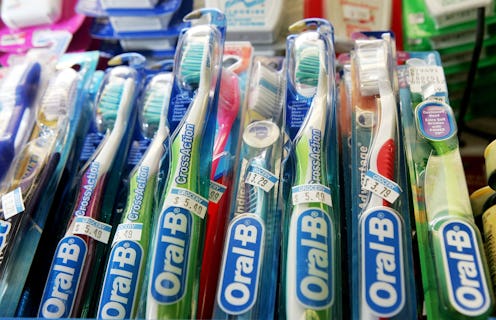
I try to stay on top of my cleaning game. I change my sheets every two weeks and throw out old makeup regularly, but I'm never quite sure what to do with my toothbrush. Buying a new one just seems like a drag, and it's only going in my mouth anyway. According to experts, you should change your toothbrush every three to four months or when the bristles begin to fray — whichever comes first. So what happens if you don't change your toothbrush enough? The answer is pretty disgusting. If you don't get a new toothbrush when it's time to change it out, you may be at risk for getting sick or, you know, having less-clean teeth.
The average toothbrush has up to 1.2 million bacteria particles, although most of those aren't harmful for you. Still, it's not hard to see why things can get gross if you put off changing your toothbrush. Even if it isn't time to get a new one, you can sanitize your toothbrush by soaking it in alcohol or dipping it in boiling water. I like to think I'm pretty clean, but this information is pretty overwhelming. I definitely haven't been taking care of my toothbrush the way I'm supposed to.
1It Can Make You Sick
This is unlikely, but it's still a disgusting possibility: If you don't change your toothbrush often enough, it could make you sick. The chances of a toothbrush re-infecting you with a cold or flu are slim, but enough bacteria hangs out on your toothbrush that another virus could develop. TODAY reports that "flu, staph, strep, e-coli, and yeast commonly live on toothbrushes." Casual. If you store your toothbrush in the same case as a loved one's, you're at risk for catching whatever they have when they're sick.
2Plaque Can Stay On Your Teeth
If you're not familiar with plaque, you may want to read this when you're not eating. It's sticky and colorless, and it's basically a layer of bacteria that coats your teeth. Brushing regularly helps get rid of plaque, but if your toothbrush is too old, the bristles will become frayed and less effective as a result. An old toothbrush won't work as well, so that filmy layer of plaque is staying put on your pearly whites.
3You Could Damage Your Gums
Gingivitis, which is also called gum inflammation, is the medical name for a gum infection, and it actually relates to dental plaque. If you're using an old toothbrush, you're not getting rid of enough plaque, as I mentioned above. If plaque is left unchecked, it can eventually turn into tartar, a mineral buildup, and damage your gums. If gingivitis isn't treated in enough time, your gums can separate from your teeth and you could even lose teeth to infection.
4Your Toothbrush May Grow Mold
It sounds sensible to keep your toothbrush in a covered container. If anything, you're protecting it from germs, right? Wrong! If your toothbrush doesn't have time to air dry, it'll stay wet, which can lead to mold. This is also why keeping your toothbrush in the shower is a really bad idea. One dentist warns to watch out for black spots on your toothbrush, because it may mean its infected with mold.
5You Could Literally Ingest Poop
This really depends on what kind of toilet you're using, how close your toothbrush is to it, and whether you close the lid before flushing. If it has a low flow, is far away from your toothbrush, and you're good about closing the lid, you're in luck! But if your toilet bowl has a fair amount of water and splashes regularly, then it's also releasing fecal particles into the air every time you flush, and they can land on your toothbrush. This totally sounds like an urban legend, but Mythbusters tested it and I'm dismayed to report that they found that it's correct. The toothbrushes in the Mythbusters experiment were "speckled with microscopic fecal matter" after being left in a bathroom for a month. So, you should really change that toothbrush.
I've never felt more motivated to make a purchase in my entire life. If you're emotionally attached to your old brush, you can always use it around the house to clean other, non-teeth items. I'll probably toss mine in a dumpster and run as fast as I can.